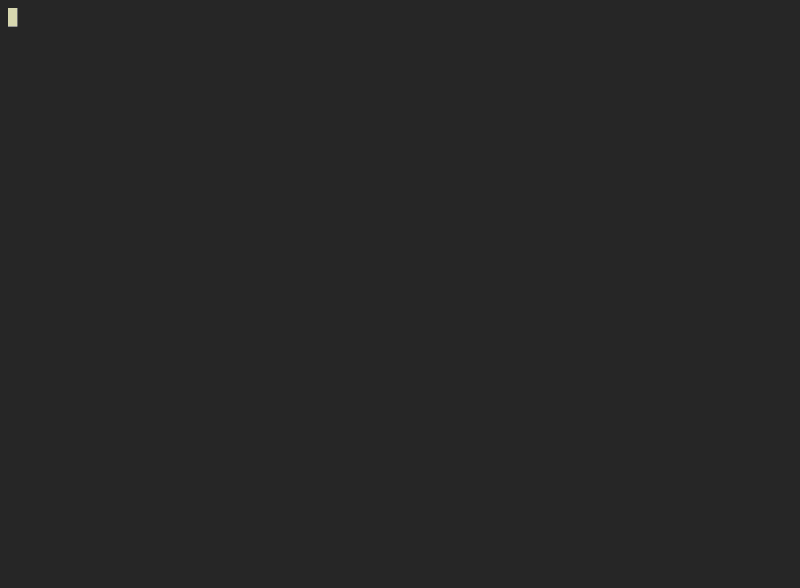39 releases (10 stable)
| 1.6.0 | Aug 12, 2024 |
|---|---|
| 1.5.0 | Apr 19, 2024 |
| 1.4.1 | Feb 2, 2024 |
| 1.4.0 | Oct 3, 2023 |
| 0.1.12 | Mar 31, 2021 |
#229 in Command line utilities
208 downloads per month
1MB
1.5K
SLoC
ttyper
ttyper is a terminal-based typing test built with Rust and Ratatui.

chat
If you're interested in contributing to ttyper, need help with an issue, or just want to hang out, you should join the development Discord server.
installation
pre-built binaries
Pre-built binaries are available for most architectures on GitHub releases. If your system is not supported or you have another problem, feel free to open an issue.
cargo
cargo install ttyper
arch linux
pacman -S ttyper
nix
nix-env -iA nixpkgs.ttyper # or nixos.ttyper on NixOS
scoop
scoop install ttyper
usage
For usage instructions, you can run ttyper --help:
ttyper 1.5.0
Terminal-based typing test.
USAGE:
ttyper [FLAGS] [OPTIONS] [contents]
FLAGS:
-d, --debug
-h, --help Prints help information
--list-languages List installed languages
--no-backtrack Disable backtracking to completed words
--sudden-death Enable sudden death mode to restart on first error
-V, --version Prints version information
OPTIONS:
-c, --config <config> Use config file
-l, --language <language> Specify test language
--language-file <language-file> Specify test language in file
-w, --words <words> Specify word count [default: 50]
ARGS:
<contents>
examples
| command | test contents |
|---|---|
ttyper |
50 of the 200 most common english words |
ttyper -w 100 |
100 of the 200 most common English words |
ttyper -w 100 -l english1000 |
100 of the 1000 most common English words |
ttyper --language-file lang |
50 random words from the file lang |
ttyper text.txt |
contents of text.txt split at newlines |
languages
The following languages are available by default:
| name | description |
|---|---|
c |
The C programming language |
csharp |
The C# programming language |
english100 |
100 most common English words |
english200 |
200 most common English words |
english1000 |
1000 most common English words |
english-advanced |
Advanced English words |
english-pirate |
50 pirate speak English words |
german |
207 most common German words |
german1000 |
1000 most common German words |
german10000 |
10000 most common German words |
go |
The Go programming language |
html |
HyperText Markup Language |
java |
The Java programming language |
javascript |
The Javascript programming language |
norwegian |
200 most common Norwegian words |
php |
The PHP programming language |
portuguese |
100 most common Portuguese words |
portuguese200 |
200 most common Portuguese words |
portuguese1000 |
1000 most common Portuguese words |
portuguese-advanced |
Advanced Portuguese words |
python |
The Python programming language |
qt |
The QT GUI framework |
ruby |
The Ruby programming language |
rust |
The Rust programming language |
spanish |
100 most common Spanish words |
ukrainian |
100 most common Ukrainian words |
Additional languages can be added by creating a file in TTYPER_CONFIG_DIR/language with a word on each line. On Linux, the config directory is $HOME/.config/ttyper; on Windows, it's C:\Users\user\AppData\Roaming\ttyper; and on macOS it's $HOME/Library/Application Support/ttyper.
config
Configuration is specified by the config.toml file in the config directory (e.g. $HOME/.config/ttyper/config.toml).
The default values with explanations are below:
# the language used when one is not manually specified
default_language = "english200"
[theme]
# default style (this includes empty cells)
default = "none"
# title text styling
title = "white;bold"
## test styles ##
# input box border
input_border = "cyan"
# prompt box border
prompt_border = "green"
# border type
border_type = "rounded"
# correctly typed words
prompt_correct = "green"
# incorrectly typed words
prompt_incorrect = "red"
# untyped words
prompt_untyped = "gray"
# correctly typed letters in current word
prompt_current_correct = "green;bold"
# incorrectly typed letters in current word
prompt_current_incorrect = "red;bold"
# untyped letters in current word
prompt_current_untyped = "blue;bold"
# cursor character
prompt_cursor = "none;underlined"
## results styles ##
# overview text
results_overview = "cyan;bold"
# overview border
results_overview_border = "cyan"
# worst keys text
results_worst_keys = "cyan;bold"
# worst keys border
results_worst_keys_border = "cyan"
# results chart default (includes plotted data)
results_chart = "cyan"
# results chart x-axis label
results_chart_x = "cyan"
# results chart y-axis label
results_chart_y = "gray;italic"
# restart/quit prompt in results ui
results_restart_prompt = "gray;italic"
style format
The configuration uses a custom style format which can specify most ANSI escape styling codes, encoded as a string.
Styles begin with the color specification, which can be a single color (the foreground), or two colors seperated by a colon (the foreground and background). Colors can be one of sixteen specified by your terminal, a 24-bit hex color code, none, or reset.
After the colors, you can optionally specify modifiers seperated by a semicolon. A list of modifiers is below:
boldcrossed_outdimhiddenitalicrapid_blinkslow_blinkreversedunderlined
Some examples:
blue:white;italicspecifies italic blue text on a white background.none;italic;bold;underlinedspecifies underlined, italicized, and bolded text with no set color or background.00ff00:000000specifies text of color#00ff00(pure green) on a background of#000000(pure black).
style = colors, { ";", modifier }, [ ";" ] ;
colors = color, [ ":", color ] ;
color = "none"
| "reset"
| "black"
| "white"
| "red"
| "green"
| "yellow"
| "blue"
| "magenta"
| "cyan"
| "gray"
| "darkgray"
| "lightred"
| "lightgreen"
| "lightyellow"
| "lightblue"
| "lightmagenta"
| "lightcyan"
| 6 * hex digit ;
hex digit = ? hexadecimal digit; 1-9, a-z, and A-Z ? ;
modifier = "bold"
| "crossed_out"
| "dim"
| "hidden"
| "italic"
| "rapid_blink"
| "slow_blink"
| "reversed"
| "underlined" ;
border types
The following border types are supported in the config file.
plainrounded(default)doublethickquadrantinsidequadrantoutside
If you're familiar with serde, you can also read the deserialization code.
Dependencies
~7–16MB
~168K SLoC